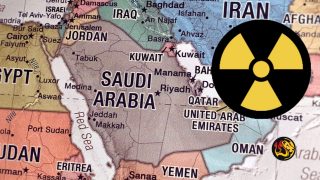
by Emmitt Barry, Worthy News Correspondent
(Worthy News) – The United States is no longer requiring Saudi Arabia to normalize ties with Israel as a condition for progressing civil nuclear cooperation talks, according to two sources familiar with the matter who spoke to Reuters. This shift comes ahead of US President Donald Trump’s visit to the kingdom next week.
The decision to drop the normalization demand marks a significant concession by Washington. Previously, under former President Joe Biden, nuclear negotiations were part of a broader US-Saudi deal that included normalization with Israel and Riyadh’s pursuit of a defense treaty with Washington.
Saudi Arabia has consistently maintained that it will not recognize Israel without the establishment of a Palestinian state. This stance posed a significant obstacle for Biden’s attempts to expand the Abraham Accords, which were signed during Trump’s first term and included normalization between Israel and the United Arab Emirates, Bahrain, and Morocco. However, recent unrest in Gaza has further delayed progress toward Saudi-Israel normalization.
New Approach in Nuclear Cooperation
US Energy Secretary Chris Wright hinted at a possible change in direction, stating during his visit to Saudi Arabia in April that both countries were on a “pathway” to a civil nuclear agreement. “When we have something to announce, you will hear it from the President. Any reports on this are speculative,” said US National Security Council spokesman James Hewitt to Reuters.
Despite dropping the normalization prerequisite, a deal remains uncertain. One central sticking point is Section 123 of the US Atomic Energy Act, which mandates non-proliferation measures, including restrictions on uranium enrichment. Saudi Arabia’s energy minister, Prince Abdulaziz bin Salman, has expressed interest in uranium enrichment and selling the product, raising concerns.
According to one source, Saudi Arabia is still hesitant to sign a 123 agreement prohibiting enrichment or plutonium reprocessing. To address this, a potential compromise being considered is a “black box” arrangement in which only US personnel would manage a uranium enrichment facility on Saudi soil.
Saudi Arabia aims to develop nuclear power to diversify its economy and free up more crude oil for export. The kingdom’s push for nuclear capability also comes amid concerns about Iran’s nuclear ambitions. Saudi Crown Prince Mohammed bin Salman has previously stated that the kingdom would pursue nuclear weapons if Iran does the same.
Meanwhile, the US and Iran are currently negotiating over Tehran’s nuclear program. US Vice President J.D. Vance stated that the talks are progressing positively. “There is a deal to be made that would reintegrate Iran into the global economy while preventing it from acquiring a nuclear weapon,” Vance said.
Trump’s upcoming visit to Saudi Arabia will include discussions on significant economic deals, including a proposed $100 billion arms package. Additionally, Trump is urging Riyadh to increase its planned US investment package from $600 billion to $1 trillion.
This trip marks Trump’s second foreign visit since resuming office, following a brief visit to Rome for the pope’s funeral. Trump developed strong ties with Gulf states, including Saudi Arabia, during his first term. After Trump left office, the kingdom notably invested $2 billion in a company founded by Trump’s son-in-law, Jared Kushner. There are also plans to construct Trump-branded towers in Jeddah and Riyadh.
Copyright 1999-2026 Worthy News. This article was originally published on Worthy News and was reproduced with permission.
Latest News from Worthy News
The U.S. State Department on Friday authorized the departure of non-emergency government personnel and their family members from Israel, citing escalating “safety risks” amid intensifying regional tensions.
Polish officials say they have uncovered Hamas-style underground tunnels along the Belarus border that were allegedly used to funnel migrants into the European Union as part of what they describe as a Russian-backed campaign to destabilize the West.
The Israeli Air Force carried out a series of airstrikes Thursday in Lebanon’s Beqaa Valley, targeting eight military compounds belonging to Hezbollah’s elite Radwan Force, according to the Israel Defense Forces.
Congressional Democrats are moving to force votes in the House and Senate to block President Donald Trump from launching military action against Iran without prior congressional approval.
The third round of nuclear negotiations between the United States and Iran ended Thursday amid sharply conflicting assessments, as diplomatic maneuvering unfolded alongside one of the largest U.S. military buildups in the Middle East in years.
The FBI obtained phone records belonging to its current director, Kash Patel, during the Biden administration while he was still a private citizen, according to multiple reports confirmed Wednesday.
A Spanish-language evangelical congregation in Houston, Texas, home to one of America’s largest Hispanic communities, is mourning its founding pastor after he was accidentally shot and killed during a reported burglary attempt.







